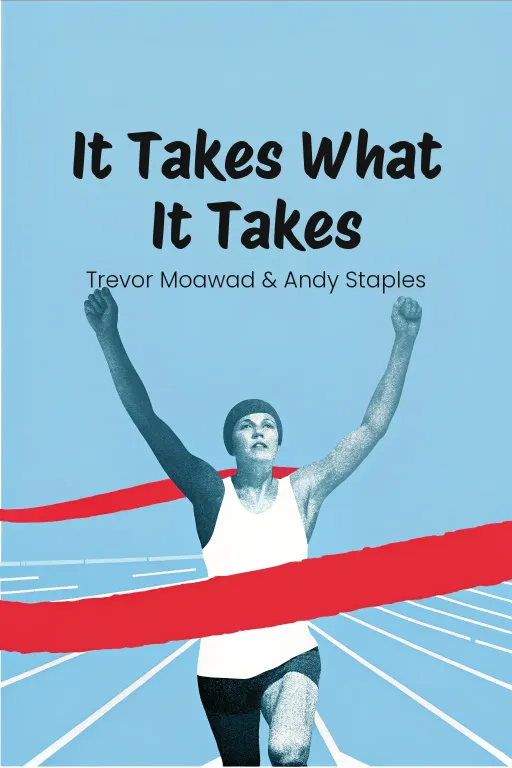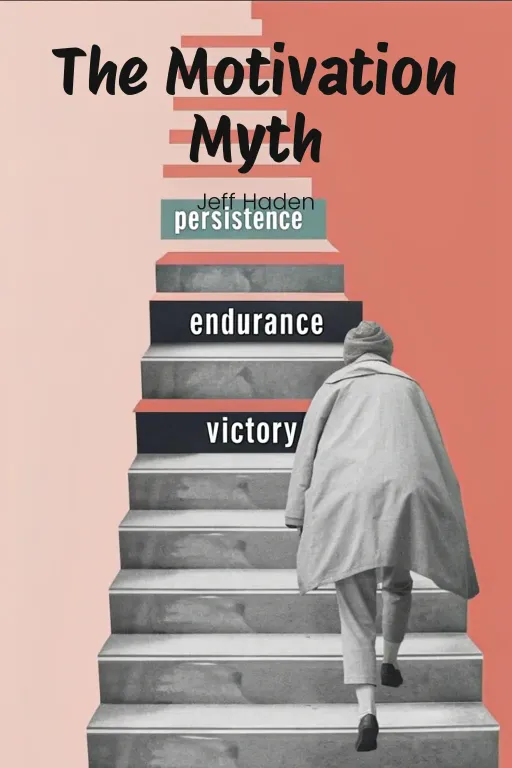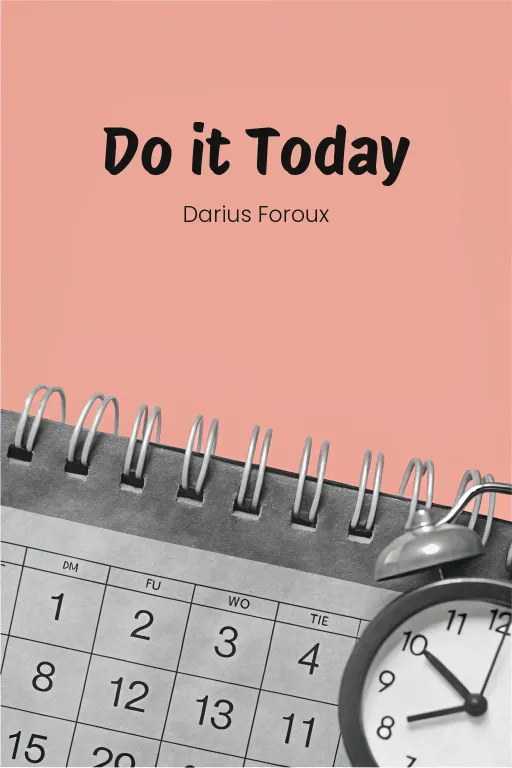
Chaos Control: Your Next-Step Action Plan
Podcast by Beta You with Alex and Michelle
How to Think Neutrally and Gain Control of Your Life
Chaos Control: Your Next-Step Action Plan
Part 1
Alex: Alright everyone, welcome! Today we've got a really interesting topic that—dare I say—could really shake up how you handle challenges, make decisions, and honestly, just how you approach each day. Michelle: Okay, Alex, are we talking the secret to everything here? Alex: Maybe not everything, Michelle, but definitely the secret to thriving when the pressure's on. We're diving into It Takes What It Takes by Trevor Moawad. It's all about how a simple shift in your thinking can totally change your results. Michelle: “Simple,” huh? I'm guessing it's a bit more involved than just "think positive?" Alex: Exactly. Moawad’s not about forcing positivity or wallowing in negativity. He's all about something called "neutral thinking". It's about focusing on exactly what's next, instead of getting caught up in the emotional rollercoaster. He’s worked with some incredible athletes, like Russell Wilson, and he’s taken that winning mindset and made it something we can all use. Michelle: Okay, so this isn’t just sports psychology for star quarterbacks? Regular folks can actually use this? Alex: Totally! That’s what I love about this book. It takes strategies that work for elite performers and makes them relevant to everyday life. And that's exactly what we will be breaking down today. Michelle: Sounds good. So, what's the plan? Alex: We're going to tackle three main things. First, we’ll unpack the psychology behind neutral thinking. We’ll look at why it’s effective and how it’s different from just being negative or forcing positive vibes. Michelle: Got it. So, a mental "Switzerland"—neutral, but…functional? Alex: Exactly! Then, we’ll dive into the specific techniques that Moawad is big on, like visualization and controlling your language. These are the tools he gave those elite athletes to “really” laser focus and block out what doesn’t matter. Michelle: Let me guess, this is where the Russell Wilson stories come in? Alex: Oh yeah, and plenty more! And finally, we’ll pull it all together, showing how these strategies can build real resilience, especially when life throws you those “really” tough, high-pressure situations. It’s like building your playbook for when chaos hits. Michelle: Turning chaos into clarity, that sounds “really” promising! Okay, Alex, you've definitely set the stage. Let's get into this.
Neutral Thinking
Part 2
Alex: Okay, Michelle, so let's jump into neutral thinking, which is kind of the foundation of what Moawad talks about. It’s not just some feel-good idea, but a real way to make smart decisions and stay clear-headed, especially when things get stressful. Neutral thinking is unique, because it's not about being unrealistically positive, or totally negative either. Michelle: So, we're not talking about fake smiles or expecting the worst. We're aiming for a more balanced approach, right? Alex: Right. It means paying attention to what's actually happening and asking good questions: "What's going on now?" and "What can I do about it?". Just the facts, no drama. Think of it as cleaning out your mental space so you can see what's next, even if it's just a tiny step. Michelle: Makes sense. But how do you actually do that when you’re super emotional? Life usually throws us curveballs that hit us right in the feelings. Alex: Emotions are unavoidable, sure, but neutral thinking is a skill you develop. Moawad uses the story of Michelleus Luttrell, a Navy SEAL in Afghanistan, to really bring this point home. Luttrell's team was attacked, and he was badly hurt, alone, and surrounded by enemies. Now, in that situation, fear could easily take over. Michelle: Yeah, I'd imagine most people would just feel hopeless. What options do you have at that point? Alex: Exactly—that's where neutral thinking kicks in. Instead of getting overwhelmed, Luttrell broke everything down into small, achievable goals. He'd focus on crawling to a line in the dirt, and then to the next one. This step-by-step mindset kept him going for seven miles until he was rescued. Michelle: Wow, seven miles. That's both amazing and incredibly simple when you think about it. He just focused on that next line, not the bigger picture. So, neutral thinking is about tackling huge problems in small steps? Alex: Exactly. And it's not just for extreme situations like Luttrell's. Moawad says that this ability to focus on what you can do, without letting emotions take over, works in everyday life. Whether you're stuck in traffic or facing a deadline at work, neutral thinking helps you cut through the noise and stay on track. Michelle: Okay, but aren’t emotions important? Isn’t that part of being human? I don't want to become a robot! Alex: Of course, emotions are part of us, but the problem is letting them control how you see things, right? Neutral thinking isn’t about ignoring emotions. It’s about knowing they're there but not letting them decide what you do. It kind of bridges the gap between being too confident and feeling hopeless, so you can make logical decisions. Michelle: That makes sense. So, what tools does Moawad suggest? How do you train yourself to think neutrally when it doesn’t come naturally? Alex: Good question. Moawad gives us some specific techniques. One is factual assessment. When something goes wrong, you start by looking at just the facts – no exaggerating, no emotional spin. Say you mess up a presentation at work. Instead of thinking, "I'm a failure," neutral thinking would reframe it as, "The presentation didn't go well. What can I do better next time?" Michelle: So, it’s about switching your perspective to focus on data instead of drama. Easier said than done, though. What else does he suggest? Alex: Visualization is another tool, but with a twist. Neutral thinkers don't just daydream about success. They mentally practice the actions they need to take to reach their goal. Think of Michael Johnson, the Olympic sprinter. He didn't just imagine winning; he visualized every part of his race—how the starting blocks felt, his stride, the turn on the track—everything based in reality. Michelle: Meaning Johnson wasn't fantasizing about the medal ceremony, but focusing on the mechanics of running. It's like practicing the recipe for a cake, not just imagining eating it. Alex: Exactly! The goal isn’t to achieve the outcome, but to perform the actions that lead to it. And that connects with Moawad’s third tool: the "Verbal Governor." This focuses on controlling your inner self-talk and what you say out loud, because words impact your thinking. Michelle: "Verbal Governor"—sounds a bit intense. So you’re supposed to police your own language? Alex: In a way, yes. Because how you talk to yourself affects how you act. Negative language makes you doubt yourself, while neutral language keeps you steady. For example, instead of saying, “I can’t fix this,” you’d say, “I haven’t fixed it “yet”, but I can figure it out.” It switches your focus from helplessness to possibility. Pretty powerful, huh? Michelle: It is powerful. But, playing devil's advocate here, doesn't this seem a little too optimistic? Is neutral thinking just positive thinking disguised? Alex: Not really. Neutral thinking isn’t about promising everything will be fine. It’s not about being optimistic; it’s about being objective. It's asking, "What's happening right now?" and "What can I do about it?". Luttrell didn’t crawl seven miles just because he believed he could. He did it by focusing on the reality – he was alive, and he could move forward, one step at a time. It's neutrality in action. Michelle: Right, I get it. It’s practical without being negative, which is rare these days. It reminds me of Apollo 13—talk about high-pressure! Alex: Exactly! The astronauts' survival is another example of neutral thinking. When the oxygen tank exploded, they could have panicked. But they, and the NASA team, stayed neutral by asking questions: “What’s the status? What resources do we have? What fixes are possible?” That calm approach saved them. Michelle: Amazing. So neutral thinking not only helps individuals, but it’s a system that works for crisis management and teams. If Apollo 13 had panicked, they could have been lost. Alex: Exactly. Whether it’s a lone Navy SEAL or a NASA team, neutral thinking is about gathering information, removing distractions, and choosing your actions carefully. And that’s why it’s so effective—it can be used in any stressful situation, from the most extreme to the everyday.
Strategies for Success
Part 3
Alex: So, understanding this mindset? It really sets the stage for diving into practical strategies, especially when the pressure's on. That's where we get to Moawad's three cornerstones: visualization, controlling your inner voice, and disciplined planning. It's a logical progression, you know? Theory to practice. These aren't just abstract concepts; they're real tools to help people focus, adapt, and “really” nail those challenges. Michelle: Okay, Alex, sounds good. So we're climbing down from Mount Theory and grabbing some tools. What's first out of this "success toolkit?" Alex: Visualization is up first, and honestly, it makes total sense. But Moawad emphasizes that it's not just about dreaming up some perfect future; it's about mentally rehearsing every single step you need to take to succeed. Think about Michael Johnson, the Olympic sprinter. Michelle: Right, Michael Johnson – the guy with the gold shoes, setting golden records. What was his visualization secret? Alex: It's fascinating. He didn't just rely on physical training; he trained his mind just as hard! Before the '96 Olympics, he visualized every tiny detail of his race—the start, how his muscles should feel, his stride, even the curve of the track. He pre-lived his success, training his brain and body to work as one. Michelle: So, wait, he created a mental highlight reel before the race, but focused on the how? Alex: Exactly! It wasn't wishful thinking—it was precise, grounded, methodical. There are studies that back this up, too. Apparently, your brain doesn't always know the difference between real and vividly imagined practice. So, visualization is a great way to mentally prepare, even under pressure. Michelle: Wow, that's “really” interesting. People usually get caught up imagining the win, not the work. It's like training your mind as thoroughly as you train your body. Alex: Precisely. And Moawad shows other examples, like how it works in recovery from surgery. Patients who visualized themselves moving, standing, walking, they often recover faster! It gives them mental clarity and a sense of control over their healing. Michelle: Okay, so for athletes, patients, anyone facing challenges, visualization isn't just daydreaming; it's mental prep. Alex: Exactly, and it needs practice. But visualization alone won't cut it. That leads us to Moawad's second tool: controlling your language and thoughts. Michelle: Ah, the "Verbal Governor"! It sounds a bit Orwellian, doesn’t it? Alex: I can see why it might sound that way, but it’s actually pretty straightforward. The basic idea is that what you say – to yourself and others – shapes how you think and, therefore, how you act. Words have serious power here. Negative self-talk like "I'm doomed" or even overconfidence like "I've got this in the bag!" can sabotage rational thought. Neutral thinking means using precise, grounded language. Michelle: Alright, Alex, give me a real-world example. Say someone bombs a presentation at work. What's the neutral way to look at that? Alex: Instead of thinking, “I'm a total failure," a neutral thinker assesses the facts: "The presentation didn’t land as intended. Where did I lose the audience? What can I improve?" It’s about observing reality and maintaining control over your next steps. Michelle: Okay, so it's less about being the language police and more about being a "mind gardener," pulling out negative weeds and planting constructive phrases? Alex: Exactly! Moawad talks about it as a "negativity diet." We let toxic media, comments, even our own inner critic flood our minds. This diet cuts those influences out, creating space for neutral language that promotes a "can-do" mindset. Michelle: Let me guess, there's a sports angle here, right? Alex: Always. Moawad talks about athletes who avoid toxic commentary—whether from social media or the press. Instead, they stick to brief, practical statements like, "Control what you can control" or "Next play." Russell Wilson is a master of this, keeping his inner dialogue focused and productive. Michelle: Got it. So, it's not just rainbows and unicorns, it’s a disciplined way to filter reality. Speaking of discipline, let's get to pillar number three: planning. How does Moawad turn principles into action? Alex: Disciplined planning is about structure and foresight. Moawad is all about creating detailed, step-by-step roadmaps, no matter if it is sports, business, or personal goals. I think the most important thing is breaking big challenges down into smaller, manageable tasks. Michelle: Like building instructions for winning? Alex: Exactly. Think about Russell Wilson and how he prepared for the Super Bowl. It wasn’t just physical—he and Moawad created a mental playbook. Wilson rehearsed game scenarios, reflected on past successes to boost his confidence, and constantly affirmed he was "built for this." Michelle: So those amazing moments on the field weren't just by chance. They were rehearsed and planned beforehand? Alex: Precisely. It shows that superhuman results come from deliberate preparation. And this approach works in business too. When setbacks happen, a solid plan allows you to adjust rather than panic. Michelle: Alright, visualization, positive self-talk, and disciplined planning—it's all pretty practical. Feels almost... human. Not intimidating, you know? Alex: That's the whole point, Michelle. These strategies aren't just for Russell Wilsons and Michael Johnsons. They're for anyone trying to gain clarity, focus, and resilience. And at the core, it's all about that neutral thinking—seeing the work ahead without letting emotions or external noise take over. Michelle: Gotta say, Alex, Moawad's techniques seem like something everyone could use right now. These tools kind of make thriving under pressure seem... well, almost manageable.
Broader Implications and Resilience
Part 4
Alex: So, armed with these strategies, it’s natural to start thinking about the bigger picture, right? Michelle, that’s where these principles really come into their own. It's not just about individual wins, is it? It's about resilience, about how these tools can shape leadership, relationships, even entire communities. Michelle: Okay, Alex, zooming out! So, am I right in thinking that neutral thinking isn't just for, you know, elite athletes or those crazy, high-pressure situations? It’s relevant to my daily slog and the wider world? Let’s take resilience first. How exactly does this mindset help when life throws a curveball? Alex: That's what I find so compelling. Trevor Moawad illustrates that in those moments of real crisis, neutral thinking can be the difference between freezing up completely and actually taking constructive action. Think back to Michelleus Luttrell, that Navy SEAL in Operation Red Wings. His story is a powerful lesson in building resilience one step at a time. Michelle: Yeah, he crawled, what was it, seven miles to safety after his team was attacked? Incredible. But how does drawing lines in the dirt translate to, say, someone wrestling with a crisis at work or just a personal setback? Alex: The core is the same. Let’s break it down simply. When Luttrell drew that first line, he wasn't focused on this overwhelming danger and his injuries. He just narrowed it down to one achievable objective: reaching that line. Then the next, and the next. Anyone can handle life the same way by focusing on what’s immediately actionable. Michelle: Aha, so instead of getting lost staring up at the mountain, you just concentrate on the next step. Actually, that's surprisingly…liberating. When you can chunk problems down like that, you do get a sense of control back from the chaos. Alex: Precisely. How often do people let feeling overwhelmed actually steal that control? Neutral thinking is a way to cut out the catastrophizing and start doing. And it gets fascinating when you apply this to leadership—seeing how resilience not only transforms an individual but can ripple outwards. Michelle: Are you about to tell me a story about someone inspiring legions with their unflappable demeanor? Alex: You know me too well! Let's talk about Bob Moawad, Trevor’s father. He was diagnosed with terminal cancer, so he had zero control over that outcome of his illness. But rather than just giving in to fear, he focused on making deliberate choices and became an example of resilience for everyone around him. One of his bedrock beliefs? "Fear and worry are involuntary, but choice is not." Michelle: Wow. Terminal cancer and he’s still practicing neutrality? Most people would just collapse under that emotional weight. Alex: Exactly. But Bob made a conscious choice for hope—not just naive, blind optimism, but really intentional hope rooted in his daily affirmations and concentrating on what he could influence. His resilience didn't just impact his journey, either. It profoundly shaped Trevor and many others around him, who saw how he faced living and dying with such honesty and courage. He turned resilience into a leadership tool, essentially. Michelle: So, we're saying leadership isn't just about your own inner steel, but it’s contagious. If the leader projects resilience, others pick it up almost through osmosis. That’s a pretty powerful ripple effect. Alex: It is. Leaders like that foster a kind of emotional steadiness in others. Take a workplace under pressure, for instance. A leader with a neutral mindset can steady their team by shifting the focus from fear to concrete action. That's what separates the transformative leaders from those who are simply consumed by their emotions. Michelle: Makes perfect sense. I can see this working in those really high-pressure business situations, maybe a CEO facing a nosediving stock price or something. But what about your everyday leaders, Alex, like parents? Can resilience extend to their world? Alex: Parenting is incredibly relatable, actually. Say a child's struggling with school. Instead of blowing it up with emotional reactions—like, "They're going to fall behind forever!"—parents can break it down into manageable solutions. What specific subjects does the child need help with? What learning methods work for them? Neutral thinking lets parents actually guide their children without causing unnecessary pressure or anxiety. Michelle: Okay, a pattern’s emerging here. It's about pragmatism in the face of uncertainty. Strip away the drama, focus on the facts, regain control, step by step. But okay, Alex, if neutral thinking is this universal, what resources do people need to cultivate resilience in their own lives? Alex: That's what brings it all together. You start with doable strategies. Chipping away at challenges, one small step at a time, that Luttrell approach. If you're buried at work, just make yourself send that one overdue email before facing the entire project. Don’t let the sheer volume freeze you. Michelle: And Bob Moawad’s affirmations play a part here too, right? Consciously choosing words to reshape your mindset? Alex: Absolutely. Daily affirmations are a foundational practice. They train your mind to approach reality with purpose and clarity. For Bob, that was saying, "I choose health and focus," even confronting something as uncontrollable as cancer. For others, it could be something as simple as, "I control how I respond." Michelle: I like that—concise, action-oriented, and forward-moving. It also ties into the idea of reframing your thoughts, doesn't it? Alex: Exactly. Reframing is one of neutral thinking’s most powerful tools. Instead of thinking, "This is impossible," you shift to, "What's the next concrete step I can take?" That subtle switch gets your mindset into solutions instead of problems. And in time, that becomes your automatic response. Michelle: And we've touched on leadership, parenting… so, what next, communities? What about everyday relationships? How does neutrality play out there? Alex: Neutral thinking is so transformative in relationships because it keeps emotional reactions in check. Imagine arguing with your partner: Neutral thinking helps you to stick to observations and solutions, not just devolving into blame or emotional meltdowns. So, rather than saying, "You “always” ignore me," you could rephrase it to: "I feel unheard when this happens. Can we work on this together?" Michelle: That's a game changer right there. Instead of fueling the fire, you dampen it and aim for a resolution. It's almost like emotional aikido: you’re redirecting the energy rather than colliding head-on. Alex: I love that analogy! And when neutrality becomes the norm in conversations, it builds collaboration, trust, and resilience in the relationship itself. The tools we've been discussing—breaking down challenges, reframing, affirmations—they’re more than just solo strategies. They’re cooperative and apply to everyone, from teams to families. Michelle: Alex, this is quite profound. From surviving on a battlefield to boardrooms to the family dinner table. Neutral thinking isn't just a set of tactics, it's a philosophy for resilience wherever you are. Alex: Exactly, Michelle. It’s about choosing clarity and decisiveness over being tangled up in your emotions. Resilience isn't just about powering through adversity; it’s about inspiring that same resilience in others, creating this spreading effect of empowerment and progress.
Conclusion
Part 5
Alex: Alright, Michelle, I think that about wraps it up . Today we really dove into Trevor Moawad’s neutral thinking, right? This idea of removing emotional bias to really sharpen our focus and, you know, identify actionable steps . Michelle: Exactly . We looked at how it bridges that gap between toxic positivity – that whole "just be happy!" thing – and, you know, just straight-up negativity, offering these really practical tools, like visualization, disciplined planning, and this "Verbal Governor ." And the beauty is, it’s not just for athletes or astronauts, is it? Alex: Not at all! It's universal . Whether you're a parent trying to wrangle kids, a team leader trying to meet a deadline, or honestly, just trying to get through your Monday, neutral thinking gives you the tools to break those overwhelming problems down into smaller, manageable chunks . And it helps you stay calm, even when things are utterly chaotic . Michelle: Right, it's that sense of control, even when everything feels out of control . We saw it with Michelleus Luttrell, right? Crawling one line at a time . And Bob Moawad, his incredible resilience in the face of something so devastating . It kind of shows how this mindset doesn't just drive personal success . It helps with leadership and even how we relate to others . It's not just a “strategy," is it? More like a whole new way to approach life . Alex: Exactly! It's a way of navigating the toughest challenges while, at the same time, inspiring the people around you . Michelle: So, big takeaway: next time you're facing something that feels impossible, just pause . Acknowledge that, yeah, you're probably feeling a lot of things, but don't let those feelings completely take over . Ask yourself: "Okay, what's the very next step I can actually take?" It’s not about dictating the outcome, because, let’s face it, you can’t . It’s about, you know, taking ownership of what you do next . Alex: Yes! And for our listeners, start small . Keep it simple . Focus on the verifiable facts, trust the process, and just… act . One, tiny step at a time . By doing that, you're not just scraping by; you're building genuine, lasting resilience . Michelle: So with that, Alex, I think we can officially say this conversation has been… neutralized . Alex: Perfectly! Thanks for tuning in, everyone . Take care, and remember, keep moving forward .









